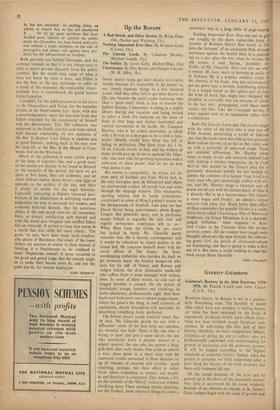Up the Rovers
A Bad Streak, and Other Stories. By Brian Glan- ville. (Seeker and Warburg, I5s.) Nothing Important Ever Dies. By Romain Gary.
• (Cresset, I5s.)
SHORT stories rarely get their deserts in reviews, mainly because it's impossible to do justice to, say, twenty separate things in a few hundred words. And they often fail to get their deserts in life, too, because the good reader (someone who likes a 'good read') tends to buy or borrow the bulkier fictions. I remember working in a public library during one vacation and being invited to select a book for someone on the basis of three or four huge and clumsy horizontal and vertical movements of the hands. Mr. Cameron Hawley, who is 'an ardent sportsman, as adept with a fly-rod or a shot-gun as he is with a type- writer' (blurb), would have filled this bill of lading to perfection. One blow from his 1 lb. 10 oz. Lincoln Lords, in fact, and the wildest of ducks would give up. So let us applaud Mr. Glan- ville, who now risks his growing reputation with a collection of short pieces. And let me do him what justice I can.
His matter is sympathetic: he writes, for the most part, of football and Jews. We've had, in the rosy Georgian past, de Selincourt and others on squirearchal cricket, all tented teas and sixes through the vicarage window. This wholesome, sporting whimsy had its harsh transatlantic counterpart in some of Ring Lardner's stories on the backgrounds of baseball. Last year we had David Storey being anti-romantic about Rugby League. But generally sport, and in particular soccer (which is arguably the only real and regular democratic experience left to us— White Hart Lane the Globe de nos fours) has lacked its bards. Mr. Glanville partly remedies that. He is fiercely contemporary and it would be ridiculous to expect psalms to the round ball. He concerns himself more with the social effects of The Game: the hero- worshipping embezzler who lavishes his theft on his favourite team; the bouncy hanger-on who lives for his talk of Jimmy and Rovers and cadged tickets; the dour diminutive inside-left who suffers from a team manager with archaic ideas. In some of these stories, an odd sort of dogged heroism is created. On the details of journalistic scoops, transfers and crockings, he seems absolutely, professionally right. And these backroom facts move out to inform larger issues: where the game's the thing, in itself symbolic of aspirations, decent description will inevitably be describing something more profound.
The Jewish stories sound similarly exact. But, oh dear, Mr. Glanville grinds his axe with a difference—some of his best Jews are enemies, , his enemies, one feels. There is the one who is trying to 'pass' and gets a nasty shock; the one who pointlessly hurts a phoney master at a school reunion; the one who has grown a thug- gish shell after early insults. One tends to admire a nice, clean point in a short story and the equivocal ironies contained in these sketches set up all manner of tensions and surmise: good reporting, perhaps, but their effect is rather facile where something as present and beastly as anti-Semitism is concerned. They batten, a bit, on the turmoils of the 'liberal' conscience without clarifying them. These nineteen stories, however, are the freshest, most observed things to come a
Nothing Important Ever Dies sets out to griP one toughly by the short, vulnerable hairs. A remake of Romain Gary's first novel, it 'fol- lows the fortunes' of an adolescent Pole through resistance against the bestial Hun in a partisan lair to a day after the war when he revisits the old scenes. I said 'batten,' probably un- kindly, of Mr. Glanville. Here you can see what it means. M. Gary deals in heroism as easily ai in foulness. He is a popular novelist, crafty in the rhetoric of his trade, who has unfortunately got his paws onto a terrible, humiliating subject. It is a weepie based on the ugliest sort of fact, the kind of book that might have whipped the doubtful or cowardly into ten minutes of valour in the last war: propaganda, until those times return, not fact. Like the Cenotaph service, it must register now as an indulgence rather than a celebration.
Both The Lincoln Lords and The Insider begin with the entry of the hero into a club just off Fifth Avenue, postulating a world of dubious chic that the books have fun with as they proceed. Both tedious heroes, in so far as they exist, end up with a pocketful of unearned credit. There are minimal differences. Mr. Hawley takes twice as many words and concerns himself less with making a literary impression. As in Cash McCall (the answer to the Times's plea for a genuinely American novel), we are invited to admire the contours of a tycoon. Linc Lord is a straw man who gets increasingly stuffed with vir- tue, and Mr. Hawley drags a reluctant sort of praise out of one with his patient detail of what it is drearily like to be a businessman. The Insider is more bogus and livelier: an adman's corpse aswarm with jokey lice. Much better than either of these contenders for popular favour is a crude, clever book called Chautauqua. Out of Sherwood Anderson, via Grace Metalious, it is a shrewdly judged titillation: what happens to Rad- ford Centre in the Twenties when the six-day carnival comes. All the women have tough male thoughts about sex (the new formula for infiltrat- ing gentle dirt), the details of circus-and-culture are fascinating. and they're going to make a film out of it. But there is really nothing to read this week except Brian Glanville.


































 Previous page
Previous page